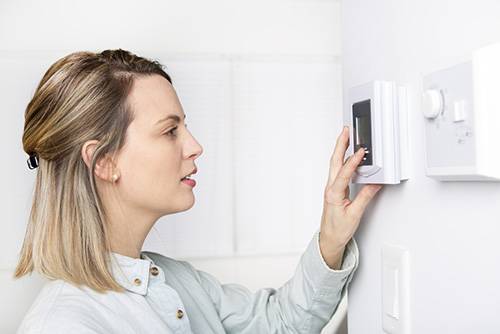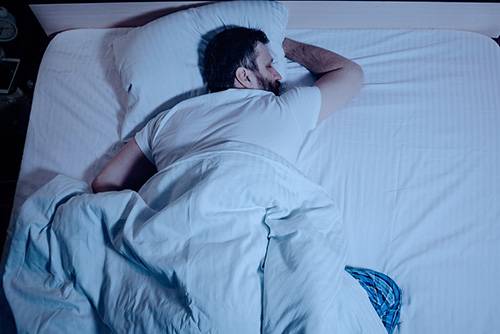
Lying head-first into your pillow can appear normal if you have been sleeping this way all of your life, but there is a concern of whether this sleep position is good for your overall health.
Sleeping on Your Stomach- Is It Bad for You?
No matter how much you try to sugar-coat it, the answer is yes. Sleeping on your stomach can severely affect your physical health. No matter what, sleeping on your stomach is going to spur some sort of pain. This is because certain muscles and ligaments are pulled more to one side than the other, which strains your spine out of alignment.
There are two vital parts of your body that will suffer under pressure the most; your spine and neck.
Why Is Sleeping on Your Stomach Harmful?
Here, we will break down precisely why being a stomach sleeper can have harmful results on the overall well-being of your body.
— Spinal Issues
It starts off in your spine. This is where the most pressure is applied when you are sleeping on your stomach. Your back is awkwardly stretched during the night as it cranes inward while your head is propped on your pillow.
Most of your weight is centered in your body, it pulls down on your stomach at night and stretches the muscles in your back, and more specifically, your spine. Your central nerves are located around your spine, meaning that pain in your spine could branch out to practically any other part of your body. You can also experience numbness in the morning in your limbs.
— Neck Issues
Issues with your neck can involve serious chronic pain. Sleeping on your stomach means your head is tilted to the side so you can breathe at night. The result of this is that your neck is constantly at a strained, awkward angle.
You can also develop a herniated disk, which occurs when the gelatinous disk that lies between the vertebrae ruptures. This is extremely painful and it will persistently irritate the surrounding nerves.
Should I Avoid Sleeping on My Stomach During Pregnancy?
No matter if sleeping on your stomach is a built-in habit, never sleep on your stomach during a pregnancy. It’s not even worth risking the first trimester on your stomach since this restricts the growth space and applies unnecessary pressure on the developing fetus.
You have to be as comfortable as possible when sleeping during pregnancy as there is much discomfort coming your way anyway. Proper sleep is one of the hardest things to get while you’re pregnant.
The best position to sleep in while undergoing pregnancy is your left side. This promotes better blood flow and optimum levels of oxygen at night.
How to Stop Sleeping on Your Stomach?
Fortunately, there are ways you can adapt to a new sleeping position.
You can use a cervical or therapeutic pillow, which will help you maintain better sleeping posture. With these pillows, it’s only possible to sleep on your back and side comfortably. Sleeping on your stomach will be too uncomfortable and wake you up, so you can change your position again.
Placing a knee wedge or pillow underneath your legs is another ideal way of maintaining better posture at night. For a quicker change in position, sleep with a full-body pillow. These pillows can only properly be used when sleeping on your side, so inevitably they will alter your sleep position once you begin to use them.
Pillows are a great way to align and redirect your body to a more suitable position. If you can’t rely on them or too many pillows around you Is uncomfortable, then it’s suggested to use willpower. The will of wanting to sleep on your back or side instead can immensely help you change your position. If you sleep with a partner, then ask them to prod you or turn you if you resort back to sleeping on your stomach.
To assess current damage to sleeping on your back, visit a chiropractor who can take an x-ray scan of your spinal alignment as well as neck.
Tips When Sleeping on Your Stomach
For some people, giving up sleeping on their stomach isn’t necessarily an option. In this case, there are ways you can make sleeping on your stomach more comfortable and less damaging to your side.
Sleeping with a thinner pillow will allow for better spinal alignment and less strain on your back. Sometimes, it’s best to consider no pillow at all. If you’re going to sleep with a pillow underneath your head, then sleep with one under your pelvis as well. This will create a more natural posture while you’re asleep so pressure doesn’t build unevenly on your back.
It’s also healthier to commit to a morning routine of working out, yoga, or simple stretches. Do something easy and gentle to prevent you from hurting yourself. Stretches help realign muscles and joints and improve flexibility.
What Are Some Positive Sleeping Habits?
You can also focus on better sleep practices to improve your overall sleep performance and minimize the effects of sleeping on your stomach.
Do something relaxing before you go to bed, allowing both your mind and body to calm down and get ready to sleep. A 20-minute warm bath before bed will cool your system down after you leave it, readying your system to sleep. You can include aromatherapy or soothing music in the background for better quality sleep. It also helps to read a book, meditate, or practice breathing exercises if you want to calm down your mind.
Check the temperature of your room to ensure it’s ideal. Preferences change between different people, but the general temperature for sleeping is around 65 degrees Fahrenheit, or 18 degrees Celsius.

If noise is an issue in your home, always keep your door closed and use earplugs to block out overwhelming sounds. It’s also a good idea to keep meals, drinks, and outings away from bedtime since these can disrupt a proper schedule. Don’t drink too much as this will lead to late-night bathroom breaks.
Better sleep isn’t hard to maintain, and learning to sleep in a new position to change from your stomach is possible. It can immensely improve your sleep quality and overall physical health.
Photo credit: Maridav/Shutterstock; Lopolo/Shutterstock; diy13/Shutterstock;
Nataliia Zhekova/Shutterstock; Dmytro Zinkevych/Shutterstock;
Africa Studio/Shutterstock; aSuruwataRi/Shutterstock








